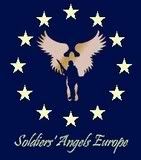 One of the most often refuted aspects of the War in Iraq is the Wests and specifically Americas reason for being there. The arguement of Liberation versus Occupation, Blood for Oil, the Bush Legacy and on it goes. I wonder, does anyone ever stop to think what would have happened to many who found themselves in the midst of Ethnic Cleansing if the West had never intervened??
One of the most often refuted aspects of the War in Iraq is the Wests and specifically Americas reason for being there. The arguement of Liberation versus Occupation, Blood for Oil, the Bush Legacy and on it goes. I wonder, does anyone ever stop to think what would have happened to many who found themselves in the midst of Ethnic Cleansing if the West had never intervened??For those who found themselves at the wrong end of Ethnic Cleansing the 'Occupation' by America and Coalition Forces is a light, an ongoing reminder that others are aware of their struggle and are willing to intervene. That we will not repeat the mistakes of 1994 when up to a million Tutsi and moderate Hutu men, women and children were slaughtered during a 3 month ethnic cleansing rampage in Rwanda.
I watched the movie 'Hotel Rwanda' tonite. For me it was particularly hard as I looked at the faces of the children on the screen and thought of the Sudanese children I see in my line of work. The 4 year old who told me of the night the police took his father away or the 6 year old who remembers seeing his father shot. The parents who collect their children covered in horrific scars. For those who have no idea what I am talking about here is some information.
The Rwandan Genocide was the 1994 mass killing of hundreds of thousands of ethnic Tutsis and moderate Hutu sympathizers in Rwanda and was the largest atrocity during the Rwandan Civil War. This genocide was mostly carried out by two extremist Hutu militia groups, the Interahamwe and the Impuzamugambi, during about 100 days from April 6 through mid-July, 1994. At least 500,000 Tutsis and thousands of moderate Hutus died in the genocide. Some estimates put the death toll between 800,000 and 1,000,000. In the wake of the Rwandan Genocide, the international community, and the United Nations in particular, drew severe criticism for its inaction. Despite international news coverage of the violence as it unfolded, most countries, including France, Belgium, and the United States, declined to prevent or stop the massacres. Canada continued to lead the UN peacekeeping force in Rwanda, United Nations Assistance Mission for Rwanda (UNAMIR). Despite specific warnings and requests from UNAMIR's commanding officers in Rwanda, before and during the genocide, the UN Security Council refused to send additional support, declined UNAMIR's request for authorization to intervene, and even scaled back UNAMIR's forces and authority. The only foreign entity to directly intervene was the French government, which sent troops not to stop the genocide, but rather to protect the genocidal Rwandan armed forces from the invading rebel force that ultimately ended the bloodshed. Link |
| Paul Rusesabagina (born June 15, 1954, pronounced [ɾusesabagina] or [ɾusesabadʒina]) is a Rwandan who has been internationally honored for saving over 1,000 civilians during the Rwandan Genocide. He was the assistant manager of the Hôtel des Mille Collines, before he became the manager of the Hôtel des Diplomates, both in Kigali, Rwanda. During the 1994 Rwandan genocide, Rusesabagina used his influence and connections as temporary manager of the Mille Collines to shelter over 1,260 Tutsis and moderate Hutus from being slaughtered by the Interahamwe militia. His story was the basis of the Academy Award-nominated film Hotel Rwanda (2004). He currently lives in Belgium with his wife Tatiana, 3 children, and adopted nieces. He drove a taxi in Brussels, and three years after he arrived in the Belgian capital, he opened a trucking company. Link |
Bill Clinton later remarked in an interview that he believed sending in a force of up to 5500 Peacekeepers may have saved the lives of up to 500,000 people. His inaction allowed the ethnic cleansing to continue for 100 days.
Faced with the same dilemma some years later a somewhat more astute President Bush decided to intervene and become an active part of attempting to end the ethnic cleansing and genocide in Iraq. It has cost the lives of many brave men and women and saved the lives of countless others. It has given people a sense of hope in a country where fear and despair are a way of life. At least this time we did not take the road of complacency. The West did not turn a blind eye as people died needlessly.
AC


